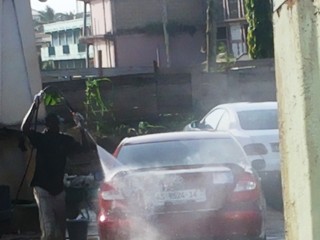Project Results:
Closing the water loop for car washing stations
Pre-phase
About the project
This project aimed to develop a business for waste water treatment for car wash stations in Kumasi, including re-use and rainwater harvesting. Reason was the pollution of surface water resources and the prevention of scarce treated water sources, which were otherwise taken away from domestic use.
This project contained the preparatory stage, the business development phase is a separate project, see this webpage.
Key results
-
A marketing study
-
Spatial mapping of 35 car washing stations in the Kumasi Metropolis
-
Determination of water consumption patterns in 7 car washing stations
-
Water quality analysis of raw water and wastewater from 3 car washing stations
-
Stakeholder meetings to share preliminary findings organized in Accra & Kumasi
-
Construction of first benchscale recycling system for wastewater from car washing stations
Tips for the future
- Make sure the lab has the right equipment to do the required testing
-
Prototypes do not have to be built at ‘full scale’, as smaller sized scale models cost less and are more easy to modify.
Potential for growth
After this pre-phase followed the business development phase. This was a separate project, see this webpage.
Project partners
NHance
Period
2016 – March 2017
Location
Kumasi, GhanaLast project updates
- My VIAWater Project Diary: A chronicle of key experiences and lessons
- Engaging stakeholders with the facts and figures on the car wash industry
- Water quality analysis for car washing stations
- Learnings from the VIAWater learning tour in Ghana
- Water quantity auditing at car washing stations in Kumasi
Background
Over the years, effluents from car washing stations in Ghana are traditionally discharged without treatment into the environment. Although this is supposed to be regulated this has not been the situation. Among the reasons for this is the lack of a low cost technology for treating the effluent. In response to this, NHance Development Partners is implementing this project to provide a technology that treats the effluent for reuse at car washing stations. This will go a long way to conserve water and protect the environment.
Project Plan
The idea behind this project is a total deviation from the conventional open loop car wash process where potable water is rendered wastewater after a single use and eventually ends up in drains leading into surface waterbodies. Rather, a paradigm shift where wastewater would eventually become raw water for use over and over again would be piloted and developed into a business to replace the status quo.
During this pre-stage, the composition of waste water will be analysed and the treatment process will be tested. Moreover a preliminary marketing scan will be undertaken.
The resulting technology, apart from being able to effectively render wastewater usable again, would be cost effective in order to provide an enticing alternative to car washing stations who might be unwilling to revert to this technology.
The project would address a key challenge of the urban water sector in Ghana while providing a low-cost technology that can be scaled up to other cities. Without closing the loop for water used in car washing stations, adequate potable water supply to urban communities would continually elude essential consumers and surface water resources would constantly be overdrawn and polluted. More so, with the dwindling water resources globally, sustainable utilisation of water is very crucial and cannot be overlooked.
Target group
Car washing station operators
Environmental Protection Agency
Water Resources Commission
Ghana Water Company Company Limited
Sustainability
The project will be rolled out eventually as a business and the system developed will be given to car wash operators for a monthly fee. The fees will be used to sustain the business.
Overview of Goals
The goals of this phase of the project are to:
1. characterize raw and wastewater in selected car washing stations in the Kumasi Metropolis
2. create a spatial map showing the distribution of car washing stations with their characteristics
3. conduct income/expenditure analysis of car wash operations to determine cost drivers, willingness and ability to pay for services
4. undertake energy demand analysis to identify energy sources and pattern of energy demand
5. engage relevant stakeholders to gain their interest and ensure their active participation in the project
Results and indicators
- Spatial mapping of car wash stations
- Development of a workable car wash effluent recycling system

